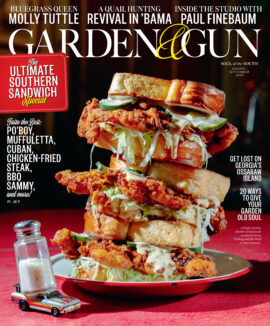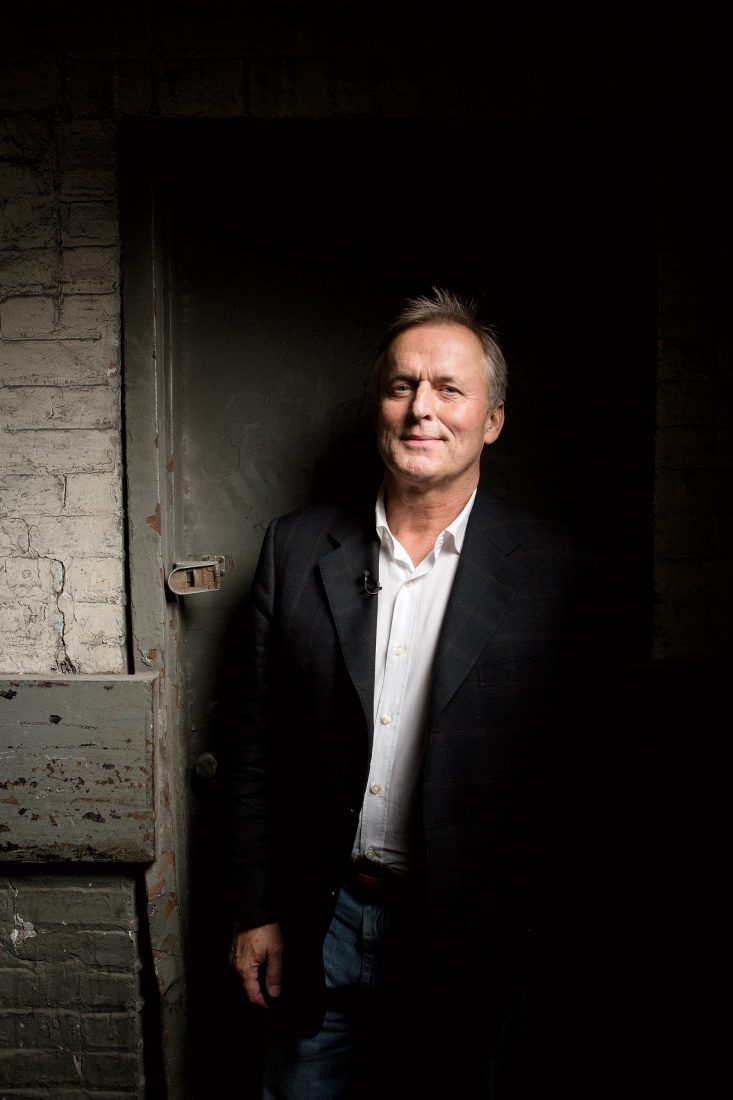Those who would dismiss John Grisham as so much literary flimflam miss the point. “I love to read Southern literature,” he says, “but I don’t aspire to write it.” What the Jonesboro, Arkansas, native does write are white-knuckle page-turners, interlocking the tableaux of the law and the South. Twenty-five years ago, his second novel, The Firm, zoomed to the top of the best-seller list, establishing Grisham as the undisputed master of the legal thriller. His thirty-six books have sold almost three hundred million copies. His latest, The Whistler, bows this fall and centers on a crusading young Florida lawyer.
Today the sixty-one-year-old splits his time between Chapel Hill, North Carolina, and his sprawling family farm outside Charlottesville, Virginia, where—in a testament to his lifelong love of baseball—he built his own field of dreams (price tag: $3.8 million). Before that he and his wife, Renee, spent years in Oxford, Mississippi, where they fund the emerging writers program at the University of Mississippi, Grisham’s law school alma mater. “Each year we bring in a new young Southern writer to live in our old house,” Grisham says, “to study, teach, write, and maybe drink for the entire year.”
What was your childhood experience of the South?
It was a very strict Southern Baptist upbringing, which was typical of those days. My parents were very devout, and I grew up in that type of close, nurturing environment: family, church, friends. At the same time it was the late sixties, and things were really changing with the cultural revolution, the music, the war, civil rights. We were really pulled between what we had been taught to believe and respecting authority and what was happening in the world.
Before there was John Grisham the author there was John Grisham the small-town Southern lawyer. Did you have sort of an Atticus Finch idealism going?
I did, yeah. My clients were always poor folks, working folks, people who were in trouble and couldn’t afford to pay a whole lot. I found it very difficult to say no to somebody who needed help, so most of my work turned out to be pro bono. It didn’t start out that way, but it turned out that way because I never got paid.
You also served for years in the Mississippi state legislature.
It made me very cynical about politics, and I think that comes across in a lot of my books. It was very frustrating—a microcosm of what you see in Washington these days. I was disenchanted with the job almost from day one. Couldn’t wait to get out of it.
So that disenchantment led to writing?
In November of 1984 I was driving back from the state capitol in Jackson, and I had this story that I had been thinking about because of something I had seen in a courtroom. And with a few twists here and there I thought it would make a great courtroom drama as played out through the eyes of a young attorney, not unlike myself, in a small town in Mississippi. I sat down with a yellow legal pad and began writing A Time to Kill. Had no idea what I was doing. It became, over a period of several years, a secret little hobby nobody knew about except my wife, because she was reading chapter by chapter.
But you had no guarantee you would ever publish it.
It took three years to write it. The book was finally published in 1989 by a small, unknown publisher in New York that went bankrupt right after it came out. They printed five thousand hardback copies; we couldn’t give ’em away. So after three years and a lot of getting up at five o’clock in the morning to write I said, “This is too hard to do again.” But I was going to try one more time, to write something frankly more commercial, and if that didn’t work I was going to quit. And the second book was The Firm.
Where did the idea for The Firm come from?
I had a buddy who was a top student, and who had a bunch of interviews after law school. He came back one time and said, “Boy, that was a really strange little law firm. I kind of got the impression that once you join the firm you never leave. It’s kind of like the Mafia.” And I thought, “That’s a good idea.” I filed it away somewhere.
When did you realize you’d hit it big?
March 17, 1991, a Sunday. I was in the back of a bookstore in Fayetteville, Arkansas, signing books, and found out The Firm was going to hit the New York Times [best-seller] list. For a new writer to hit “the big list,” as we used to call it, that’s a big moment, and the book really took off from that point on. I lost all interest in being a lawyer and being a politician.
Switching gears: What prompted you to build the baseball park?
I built it close to our house in Virginia. We moved here in 1994 and I soon realized—my son was then eleven years old, and I was very active in coaching Little League baseball in Oxford—that there were no baseball fields in our part of the county. So I got ticked off about that and started building a park with seven fields and five hundred kids playing every year. I’m the commissioner and I own it and I make all the rules. [Laughs.]
Speaking of Oxford, what is it about that town that has made it such a literary haven?
Well, Faulkner put it on the map, but you know, Faulkner was never accepted by the local people. He was impossible to read, he was kind of a misfit, he drank too much, and he had a bad rep. I think it changed thirty-some years ago when the Howorths opened [Square Books]. It’s such a magnet for writers, and there is a really strong base of people who come to the signings, who support it. The university has a great MFA program. It just has an atmosphere that’s unique. When I moved there in 1990, I would hang out with Barry Hannah, Willie Morris, Larry Brown. I was the rookie. Those were some great times.
Do you find it hard to unplug from writing?
Very difficult. I have a hard time working slow. I’ve been criticized by critics for twenty-five years—most don’t know their ass from a hole in the ground—about writing too much, writing too fast, not spending enough time. My wife would say that when I do work slow, what I write is not worth printing.
Well, you can guess what they got paid for the review, and you know what you got paid for the book. So there’s that.
[Laughs.] There’s a ton of revenge.








